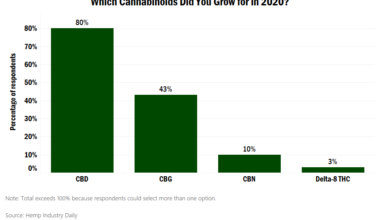
Senate Majority Leader Chuck Schumer’s commitment to make federal marijuana reform a priority sent cannabis stocks surging last week and thrilled advocates, but experts caution that high hurdles persist for comprehensive legislation to pass Congress.
What makes the task especially difficult in the U.S. Senate is that 60 votes likely will be required for passage – a tall order in today’s hyperpartisan atmosphere.
“It gives more energy that (Schumer) is fighting for this, that he wants to do something and that it’s a priority,” said Michael Correia, lead lobbyist for the Washington DC-based National Cannabis Industry Association (NCIA).
“But to get to 60 senators is going to be a heavy lift.”
At the same time, it’s unclear what will happen to more piecemeal reform efforts such as cannabis banking legislation. The measure enjoys strong bipartisan support.
But new Senate Banking Chair Sherrod Brown, an Ohio Democrat, reportedly said that marijuana banking should be combined with comprehensive criminal sentencing reform.
That has raised questions about passage of a stand-alone bill to make it easier for banks to serve cannabis companies.
Banking reform is “teed up. It’s the easiest low-hanging fruit with the longest track record,” Correia said.
Reform hopes high
Still, hopes for reform are high, given the Democrats’ new-found control of the House, Senate and presidency.
Schumer, a New York Democrat, has said he wants to end the federal government’s prohibition targeting marijuana and “repair the damage done to communities by the War on Drugs.”
Schumer and fellow Democratic Sens. Cory Booker of New Jersey and Ron Wyden of Oregon announced in a joint statement last week their commitment to developing a comprehensive marijuana reform bill.
The three held a Zoom call on Feb. 5 to talk with social justice advocates about it.
The Democratic senators intend to release a discussion draft in the early part of this year and introduce a bill in the first half of 2021, arguing the measure would “ensure restorative justice, protect public health and implement responsible taxes and regulations.”
I had a great meeting yesterday with @SenBooker, @RonWyden, and leading marijuana justice groups from across the country to strategize about working together to end the federal prohibition on marijuana and repair the damage done to communities by the War on Drugs.
— Chuck Schumer (@SenSchumer) February 6, 2021
“I think it’s very significant when you have the majority leader pushing for comprehensive legislation of this kind and joined by other leading members of the party,” said Steve Fox, strategic adviser for the Cannabis Trade Federation.
But the clock is ticking. Reform advocates have only a two-year window to pass a comprehensive bill.
The president’s party often loses the House during midterm elections. Legislation also must be reintroduced when a new Congress convenes every two years.
Narrative change
The NCIA’s Correia said the dynamic really changed when Democrats won both Georgia Senate runoff races in January.
With those victories, the Democrats took control of the Senate through a 50-50 split, with Vice President Kamala Harris as the tiebreaker.
As a result, Democrats are the committee chairs and the “whole narrative changes,” Correia said.
That represents a dramatic shift from former Senate Majority Leader Mitch McConnell’s “no no no” to even discussing marijuana reform.
Public opinion also supports reform: 68% of Americans favor federal marijuana legalization, according to the latest Gallup poll, published in November.
In a recent Emerson College poll, a higher percentage of Americans (61%) favored recreational marijuana over rejoining the Paris climate talks or establishing a $15-an-hour minimum wage.
Ambitious plan
Still, Pablo Zuanic, an investment analyst for New York-based financial services firm Cantor Fitzgerald, is worried about the ambitious approach – versus smaller, individual bills.
“Cannabis stocks have reacted favorably, although to us the news is mixed,” he wrote in a recent research note.
He views Schumer’s effort as a “sign of Democrats going for the ‘whole enchilada’” in a “bill of bills.”
“It will be a stand-alone bill, very likely. That said, MJ reform will not be done in isolation, and it will need to be consistent with other reforms from the new Administration – such as health care, criminal justice, racial justice,” Zuanic wrote.
Amber Littlejohn, executive director of the Minority Cannabis Business Association, said her association was one of the groups invited to the Feb. 5 Zoom call.
“We’re happy that the conversations will be inclusive of economic justice and minority entrepreneurs,” she said. “That’s been a missing piece from a lot of the discussions.”
But she also noted there are many policy issues to resolve “on this path to legalization.”
Industry unification effort
The reform push comes at a time when a new nonprofit organization called the US Cannabis Council (USCC) has been formed by a number of major industry trade and advocacy groups and more than 30 cannabis businesses.
Steve Hawkins, the new group’s interim CEO, said the Senate leaders’ push for legalization underscores the importance of the cannabis industry having a unified voice such as USCC.
“Certainly, this is a moment in Congress where we might actually accomplish the end of prohibition,” Hawkins said.
“What’s different (about USCC) is that there’s not 25 different people knocking on Schumer’s door. We will accomplish nothing with that kind of strategy.
“We do know when things are splintered and fractured, as reform efforts have been before, we end up failing.”
A number of groups, however, decided not to join USCC, including the Minority Cannabis Business Association, the NCIA and the National Cannabis Roundtable (NCR).
NCR spokesman Terry Holt said: “We are hopeful for a broad effort and look forward to working with everybody, but there are serious policy considerations to make, and we think it’s appropriate to directly work for our members and their priorities.”
“We feel pretty optimistic,” he added. “There’s some cross-the-aisle work to be done.”
But, Holt added, “Republicans have slowly warmed to cannabis as they’ve seen more and more states move in that direction.”
The NCR announced this week that Kathleen Seblius, the secretary of the U.S. Department of Health and Human Services in the Obama administration, has become an honorary co-chair, along with former House Speaker John Boehner, a Republican.
Sebelius expands the organization’s political clout. NCR’s chair is Charlie Bachtell, CEO of Chicago-based marijuana multistate operator Cresco Labs, which also is part of the new U.S. Cannabis Council.
Holt indicated the NCR believes that cannabis banking reform could be a good first step.
“As we move from relief and recovery into a growing economy post-pandemic,” he said, “we feel things like the SAFE Banking Act and other moves could really leverage this growing industry to the benefit of a public good.”
Jeff Smith can be reached at [email protected]
Medical Disclaimer:
The information provided in these blog posts is intended for general informational and educational purposes only. It is not a substitute for professional medical advice, diagnosis, or treatment. Always seek the advice of your physician or other qualified healthcare provider with any questions you may have regarding a medical condition. The use of any information provided in these blog posts is solely at your own risk. The authors and the website do not recommend or endorse any specific products, treatments, or procedures mentioned. Reliance on any information in these blog posts is solely at your own discretion.






